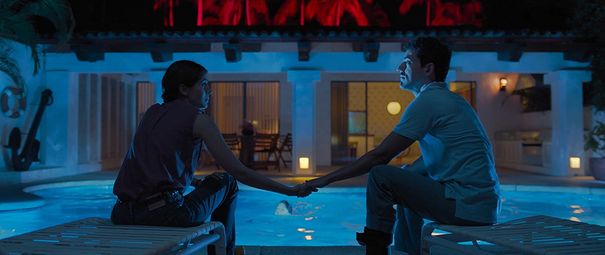The Paradise Offered by Sebastián Hofmann
Edgar Aldape Morales

Tiempo compartido
When we think of paradise, we imagine a vast pleasant place, full of energy and color. We know, however, that these images are part of an ephemeral existence that disappears as they move ever farther away from human contact. This is perhaps the idea that Mexican director Sebastián Hofmann wishes to convey to us in TIME SHARE (2018), as he did in his first feature film, Halley (2012).
Unlike his opera prima, however, in which paradise is dissolved from the beginning, the visual construction of his most recent film suggests that it will discomposed little by little. The idyllic “experience” offered by the vendors of holidays in luxury resorts is gradually transformed into an unsettling specter, based on a chromatic idea of delirium. Starting with the clash between a hotel employee and a tourist upset that, owing to an overbooking error, he will have to share a room, the director sells the idea of paradise through social commentary and family dynamics, in a form that draws on the stylized approach of his first film.
The Eden presented here is transformed by psychosis and emotional vulnerability, exhausted by an idea of happiness which, very different from the beauty and the boredom of the trilogy filmed by Austrian director Ulrich Seidl in 2012-2013, is rooted in a plain treatment of psychological desperation and social comfort, subjects of a recent Mexican independent cinema that is still looking for a wider audience.
(translated by Gregory Dechant)

